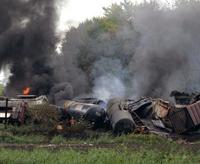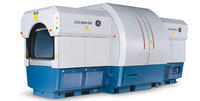-
NYPD commissioner: tighter security needed at Trailways bus depot
During the past decade, a New York man stole more than 150 buses from an unsecured Trailway bus depot in Hoboken New Jersey; the doors were open, the key were left in the ignition, and he just drove off the lot, using the coaches for everything from fast-food runs to jaunts to North Carolina; he was finally collared last week after he stole a bus, drove to Manhattan, and took a group of flight attendants to Kennedy Airport
-
-
Obama proposes ambitious $50 billion infrastructure program
President Barack Obama unveiled an ambitious 6-year infrastructure investment program; its goals include building or repairing 150,000 miles of roads, 4,000 miles of rail lines, and 150 miles of airplane runways; the plan also includes a new air-traffic-control system designed to reduce flight delays, and an “infrastructure bank” that will help determine the worthiest projects
-
-
Transportation industry eager for more details of infrastructure plan
The White House released an information sheet that tells in broad strokes how the administration plans to use the money but did not say how much it will spend on different transportation segments or how soon it will ask Congress for the money; industry groups want to know
-
-
Railroads do not let HAZMAT teams know what is on train

Lethal chemicals roll through the backyards of cities and towns without the knowledge of these towns; residents; railroads do not share information about the schedule and contents of HAZMAT cargo with these towns’ emergency services, so the services cannot prepare for catastrophe; if chlorine or ammonia were to escape from a punctured tanker — in an accident or derailment — it would form a toxic cloud; a compromised 90-ton rail car of chlorine could create a plume fifteen miles long by five miles wide; the U.S. railroad industry transported some 75,000 tank cars of toxic inhalants nationwide in 2009
-
-
New baggage screening system from Morpho Detection evaluated

Unlike most baggage-screening systems that create two-dimensional images of objects inside luggage, the CTX 9800 DSi scanners from Morpho Detection create three-dimensional images that can be digitally manipulated by personnel when a bag is deemed to be suspicious; the machines also use advanced software to detect suspicious items; Mineta San Jose International Airport once used 28 machines to process 1,800 bags an hour, but the new system will be able to process the same number of bags using eight machines and require fewer employees to supervise the process; the technology reduces reliance on human observation and interaction with the bags; for the majority of bags, employee contact is only required when a piece of luggage is placed on or taken off the conveyor belt
-
-
Tire tags reveal driver whereabouts
As computerized systems are being increasingly used in automobiles, critics are asking what safeguards system makers are putting in place to prevent vulnerabilities in such systems, knowing that bugs and security holes invariably sneak into all software
-
-
TSA enlisting parking attendants and meter maids in anti-terror campaign
From the 1993 attempt on the Twin towers, to Timothy McVeigh, to Faisal Shahzad, the United States has experience with terrorists using vehicles to carry out their plots; TSA’s First Observer program will roll out lesson plans for workers such as parking attendants and meter maids to help them become the latest anti-terror weapons
-
-
Keeping trains on track
Tel Aviv University helps develop early-warning hazard system for the world’s railways; researchers are collecting high-tech sensing data from satellites, airplanes, magnetic and soil sensors, and unmanned aircraft to devise a solution that will provide a reliable early-warning system for train operators; the solution will help keep trains on track during natural disasters and acts of terrorism
-
-
It will cost $77 billion to shore up U.S. ground transportation infrastructure
It would cost $77.7 billion to bring the U.S. mass transit systems, bus and rail included, into a state of good repair; most of the $77.7 billion backlog can be attributed to rail, but more than 40 percent of the U.S. buses also are in poor to marginal condition; in addition, an annual average of $14.4 billion would be required to maintain the systems
-
-
TSA wants more bomb-sniffing dogs to protect air, ground travelers
The Transportation Security Administration (TSA) wants to increase the role dogs play in sniffing out terror threats at U.S. airports and other mass transit systems; TSA requested $71 million from Congress to train and deploy 275 explosives detection canine teams — bomb dogs and their handlers — at transportation facilities
-
-
Attacks on trains: what the numbers say
Terrorists see public surface transportation as a killing field; despite their continuing obsession with attacking commercial aviation, when it comes to wholesale killing, trains and buses offer easily accessible concentrations of people
-
-
GAO: TSA is yet to conduct risk assessments for U.S. transportation systems
GAO criticizes TSA for taking its time conducting comprehensive risk assessments across the transportation sectors it is responsible for securing; according to the GAO, DHS still does not use a comprehensive risk management framework to secure intermodal facilities across aviation and surface transportation sectors
-
-
Who is to blame for delays in installing surveillance cameras in NYC?
The project of installing surveillance cameras in New York subways was meant to be completed by Lockheed martin by August 2008; now, nearly two years later, the best-case scenario is completion (by a company or companies other than Lockheed) of a scaled-back electronic security system by some time in 2012; Lockheed Martin, NYC blame — and sue — each other for contract violations
-
-
U.S. to expand freight congestion tracking initiative
The worst traffic bottleneck in the United States is the I-290 interchange with I-90 and I-94 in Chicago, where the average speed at 5 p.m. drops to 15 mph; the average peak hour speed is 23 mph, and the average non-peak hour speed is only 33 mph; data gathered from trucks identifies bottlenecks, and could help steer infrastructure planning
-
-
Russia plans to install explosives detectors in metro
Russia will install explosive detectors in train stations in major cities; the sophisticated security system will be installed by 2014, and will feature security checkpoints at entrances in all transportation hubs, registration of all passengers, and ID-verified sales of tickets on all means of public transport, including inter-city buses
-
- All
- Regional
- Water
- Biometrics
- Borders/Immig
- Business
- Cybersecurity
- Detection
- Disasters
- Government
- Infrastructure
- International
- Public health
- Public Safety
- Communication interoperabillity
- Emergency services
- Emergency medical services
- Fire
- First response
- IEDs
- Law Enforcement
- Law Enforcement Technology
- Military technology
- Nonlethal weapons
- Nuclear weapons
- Personal protection equipment
- Police
- Notification /alert systems
- Situational awareness
- Weapons systems
- Sci-Tech
- Sector Reports
- Surveillance
- Transportation
Advertising & Marketing: advertise@newswirepubs.com
Editorial: editor@newswirepubs.com
General: info@newswirepubs.com
2010-2011 © News Wire Publications, LLC News Wire Publications, LLC
220 Old Country Road | Suite 200 | Mineola | New York | 11501
Permissions and Policies
Editorial: editor@newswirepubs.com
General: info@newswirepubs.com
2010-2011 © News Wire Publications, LLC News Wire Publications, LLC
220 Old Country Road | Suite 200 | Mineola | New York | 11501
Permissions and Policies
